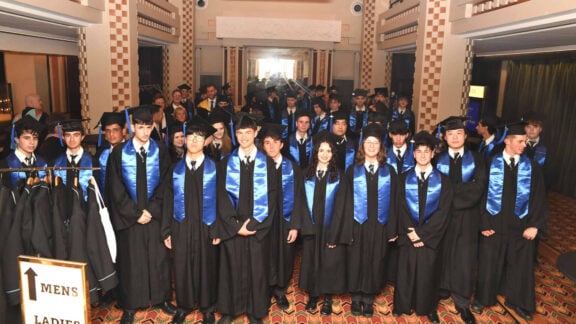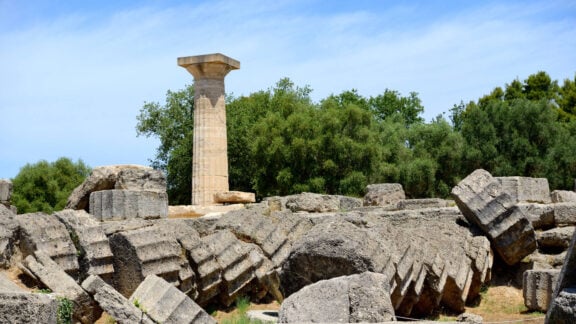Growing up in Melbourne, I was just your average Greek-Australian kid who wasn’t exactly enamoured when told I had to attend Saturday morning Greek school.
My father and uncle conspired to ensure this happened. Dad would say, if you want to play football, you also have to go to Greek school, you can’t have one without the other.
My uncle used to drive me to Greek school brainwashing me along the way. In the car, it was always three music choices, Greek, Greek or Greek. Even in that, there was no variety, only hard core rembetika. In the end I learnt expressions like ‘ το βαπόρι από την Περσία, φέρτε πρέζα να πρεζάρω’. Not exactly useful in everyday conversational Greek. Mind you nowadays my Greek music tastes are more diverse but I don’t mind rembetika.
Although I attended reluctantly the first few weeks, Greek school was fun, the teachers found ways to keep us engaged. They used catchy songs and rhymes in teaching ‘γραμματική’, they had interesting topics on Greek Mythology for reading comprehension, small plays and presentations to practice public speaking were frequent, and of course Greek dancing classes to give our minds a break. In other words, primary school was a breeze.
Then high school began, the workload started to increase, both at day school and after hours Greek school. Homework was grudgingly Friday night after football training, or if tired Saturday morning just before Greek school. Not ideal, always rushed but I ploughed through. As I progressed towards Year 9, the lessons naturally became more difficult, requiring more effort, focus and concentration. I couldn’t wing it any longer.
Things get to a level where you need to apply yourself seriously, it became difficult to bluff your way. I lacked motivation and I couldn’t justify waking up every Saturday morning to go to Greek school. At the same time, the demands of football training increased as I started playing for an academy team, something had to give. If you ask a teenager, what would you prefer Greek school or playing more football, I think the answer is obvious. I was warned by my uncle that I would regret dropping out of Greek school later on in life, but I was too immersed in football to heed his advice. My only saving grace was that I had developed a basic oral confidence of the language which no doubt was facilitated by interacting regularly with my grandparents.
My first visit to Greece had a profound effect on me. After graduating from high school, I went to Greece for the first time to visit my distant relatives and celebrate Christmas with them. I met uncles, aunties, second and third cousins, friends of the family, most of whom only spoke Greek. It was up to me to try and communicate in Greek. Suddenly it was as if all I could say was γεια σου, τι κανείς, ναι and ευχαριστώ. My relatives thought I was shy but for those that know me, the opposite is true. There would be conversations at the dinner table and I would have to concentrate so much just to get an idea of what they were saying. Even when I knew what they were saying, I couldn’t contribute to the conversation because by the time I figured out what I wanted to say, the topic of conversation had moved on.
I struggled to truly connect with my relatives as I couldn’t communicate properly. It was only at that moment that I realised how different the quality of my conversations in Greek would have been had I continued and graduated from Greek school.

Living in Europe for the last seven years and visiting Greece regularly has done wonders for my Greek language skills. During Covid, I also spent 4-5 months in Greece where I managed to get my drivers license on a manual and driving on the wrong side of the road. I would go to the hairdresser and request a σβύσιμο, a fade haircut. When it comes to articles, gender agreement and noun declensions, I still make many mistakes but I can easily have a lengthy conversation on most matters. People respected the effort you were making and were always encouraging.
I was lucky enough to have grandparents that couldn’t speak English forcing me to learn and attempt to communicate with them in Greek. This played a massive role in my development. The question is what is going to happen to future generations when it comes to language maintenance. In the main, today’s grandparents have English as their first language. I have Greek Australian friends that don’t know any Greek. How will they pass on the language? We should all make an effort to keep this beautiful language alive. My advice to anyone, not just those of Greek background, make an effort to engage with your ancestral tongue, no matter what it is. Languages are valuable, they give you insights into people and other cultures. You’ll only be richer for it.
Currently I am working as a strength and conditioning coach for a football academy in southern Spain’s Andalucia region where many of the locals speak little if any English. Some might see this as a disadvantage but believe me long-term, it’s the perfect environment to immerse oneself in a language. I’m not going to make the same mistake as I did during my Greek school days, on the contrary I relish this opportunity.
Some of the main factors that helped me fast track my Spanish was surrounding myself with native speakers and immersing myself in Spanish culture. Many of my work colleagues are Spanish and have only minimal proficiency in English, therefore forcing me to be better prepared when it comes to communicating in order to effectively perform my job. When I’m doing training drills, I try to familiarise myself with the relevant football terminology knowing that I will have mixed groups.
It also helps that there are similarities between Greek and Spanish culture. The food is very similar, although I believe no one does it quite like the Greeks. We have μεζέδες, they have tapas. We have Greek time, they have Spanish time, both societies cherish their siestas, and both peoples wouldn’t think twice about having a late night or even midnight meal.
Living in Europe, and this applies to many other parts of the globe, the default position of most people is that they are at a minimum bilingual. We need to move away from the lazy mindset, that English will get us through. Most of us only get one crack in life in learning a language, make the most of it.
So, for those going through the Greek school system in Australia, or learning any other language, give it your best shot, the pay off might be long-term but is something you’ll never regret in life.









